

Civilization & Geography. Choice Theory. Economics. Essentialism. Issues Society. Marxism & Associated Ideas. Political Science. Poverty. Psychology. Scociology. Social Perceptions. Statistics (social science) Denver Airport Conspiracy Theory: A Documentary (part 2) Register your domain at register.gkg.net. Personal Identity Is (Mostly) Performance - Jennifer Ouellette. “Surely you don’t believe in that nonsense.”
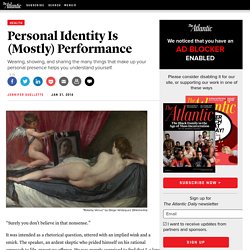
It was intended as a rhetorical question, uttered with an implied wink and a smirk. The speaker, an ardent skeptic who prided himself on his rational approach to life, meant no offense. He was merely surprised to find that I, a lover of science, tote a battered key chain embossed with my astrological sign: Taurus. I’ve carried it with me for twenty years, like a personal totem. Leading cultural theorist Stuart Hall dies aged 82. Symbiosis. In a symbiotic mutualistic relationship, the clownfish feeds on small invertebrates that otherwise have potential to harm the sea anemone, and the fecal matter from the clownfish provides nutrients to the sea anemone.
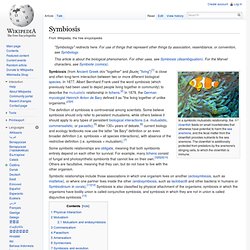
The clownfish is additionally protected from predators by the anemone's stinging cells, to which the clownfish is immune. Symbiosis (from Ancient Greek σύν "together" and βίωσις "living")[1] is close and often long-term interaction between two or more different biological species. In 1877, Albert Bernhard Frank used the word symbiosis (which previously had been used to depict people living together in community) to describe the mutualistic relationship in lichens.[2] In 1879, the German mycologist Heinrich Anton de Bary defined it as "the living together of unlike organisms. "[3][4] Some symbiotic relationships are obligate, meaning that both symbionts entirely depend on each other for survival.
Physical interaction[edit] Alder tree root nodule Mutualism[edit] Parasitism[edit] Golden Rule. Book with "Dieu, la Loi, et le Roi" ("God, the law and the king") on one page and the golden rule on the other, by Bernard d'Agesci.
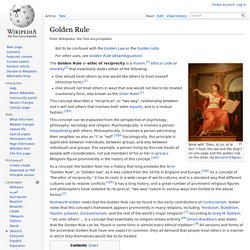
One should treat others as one would like others to treat oneself (directive form).[1]One should not treat others in ways that one would not like to be treated (cautionary form, also known as the Silver Rule).[1] This concept describes a "reciprocal", or "two-way", relationship between one's self and others that involves both sides equally, and in a mutual fashion.[3][4] This concept can be explained from the perspective of psychology, philosophy, sociology and religion. Psychologically, it involves a person empathizing with others. Philosophically, it involves a person perceiving their neighbor as also an "I" or "self".[3][4] Sociologically, this principle is applicable between individuals, between groups, and also between individuals and groups. Rushworth Kidder notes that the Golden Rule can be found in the early contributions of Confucianism.
India[edit] Dead Sociologists Index. Marxists Internet Archive. The Anarchist Library. 8 Stages of Successful Social Movements. DC's Poorest Residents Fight Displacement by Gentrification. (Photo: Ted Eytan / Flickr) Barry Farm, a public housing complex in southeast Washington, "is the line in the sand," says Schyla Pondexter-Moore, a community organizer.
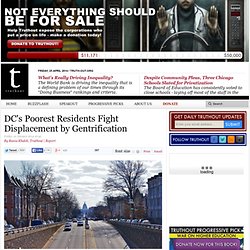
"If you take away Barry Farm, you're basically just giving away the whole Ward 8. " Barry Farm is the latest battleground for grass-roots housing advocates in the nation's capital, where intense gentrification has altered the city's demographic landscape dramatically. Because Washington was America's first city to have a black majority, it came as a shock to many in 2011 when DC's black population dropped below 50 percent for the first time in more than 50 years.
In the past decade, the district lost nearly 40,000 black residents, many driven out by skyrocketing rents fueled by an influx of mostly white professionals flocking to increasingly gentrified neighborhoods. Florida’s flawed “voter-cleansing” program. If Vice President Al Gore is wondering where his Florida votes went, rather than sift through a pile of chad, he might want to look at a “scrub list” of 173,000 names targeted to be knocked off the Florida voter registry by a division of the office of Florida Secretary of State Katherine Harris.
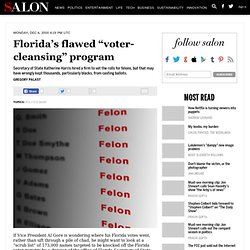
A close examination suggests thousands of voters may have lost their right to vote based on a flaw-ridden list that included purported “felons” provided by a private firm with tight Republican ties. Early in the year, the company, ChoicePoint, gave Florida officials a list with the names of 8,000 ex-felons to “scrub” from their list of voters. But it turns out none on the list were guilty of felonies, only misdemeanors. The company acknowledged the error, and blamed it on the original source of the list — the state of Texas.
Open source sociology. Sexism & Media. Data Bases. Sociology. Research. Social sciences. U.S. Demographics. Crime and Punishment. Gender and Sexuality. Social Studies. Geography. MALS. Independent Study. Sociology. Humanities, Government and Social Science Majors. Social Science Theory/Research. Open Source Textbooks. Theory. Activist Ads & Co... The Muck We Must Climb Out Of. Humanities & social sciences. Subjects of learning. 2 - root node (my real tree Pearl Trees Version 1.0)